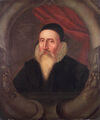Template:Selected anniversaries/July 13: Difference between revisions
No edit summary |
No edit summary |
||
| Line 13: | Line 13: | ||
||1793: Jean-Paul Marat dies ... physician and theorist ... French Revolution ... a vigorous defender of the sans-culottes and seen as a radical voice. He published his views in pamphlets, placards and newspapers. Pic. | ||1793: Jean-Paul Marat dies ... physician and theorist ... French Revolution ... a vigorous defender of the sans-culottes and seen as a radical voice. He published his views in pamphlets, placards and newspapers. Pic. | ||
||1804: Francis Whishaw - civil engineer. He was known for his role in the Society of Arts, and as a writer on railways. Later in life he was a promoter of telegraph companies. Death date uncertain 1856. | |||
||1807: Johann III Bernoulli dies .... He was known around the world as a child prodigy. Pic. | ||1807: Johann III Bernoulli dies .... He was known around the world as a child prodigy. Pic. | ||
Latest revision as of 09:24, 6 March 2025
100 BC: Roman general and statesman Julius Caesar born. He will play a critical role in the events that led to the demise of the Roman Republic and the rise of the Roman Empire.
1527: Mathematician, astronomer, and astrologer John Dee born. He will achieve high status as a scholar and play a role in Elizabethan politics.
1896: Organic chemist Friedrich August Kekulé dies. From the 1850s until his death, Kekulé was one of the most prominent chemists in Europe, especially in theoretical chemistry. He was the principal founder of the theory of chemical structure.
1956: John McCarthy (Dartmouth College), Marvin Minsky (MIT), Claude Shannon (Bell Labs), and Nathaniel Rochester (IBM) assemble the first coordinated research meeting on the topic of "Artificial intelligence" at Dartmouth College in Hanover, NH. USA.
1972: Signed first edition of Skip Digits, Conductor sells for one million dollars; House Democrats say money trail leads to Richard Nixon.
1973: Watergate scandal (nonfiction): Alexander Butterfield reveals the existence of the "Nixon tapes" to the special Senate committee investigating the Watergate break-in.
1974: Mathematician and crime-fighter Hilary Putnam publishes his landmark paper arguing that mathematics is not purely logical, but "quasi-empirical", and that we should beware the possibility of "quasi-empirical crimes".







